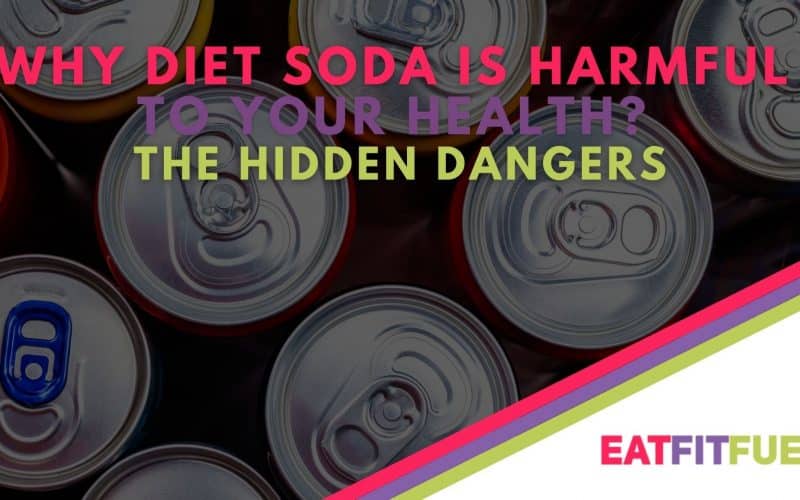A lot of people think that diet soda is a better alternative to regular soda. It has zero calories and zero sugar, so it must be healthier, right? Not exactly.
Studies have shown that there is an increasing link between diet soda and serious health risks. This includes weight gain all the way to something as grave as heart disease.
But why are diet sodas less healthy than regular sodas despite having zero calories and zero sugar? How do they affect our body and what are the other health risks in consuming them? Let’s find out in this comprehensive guide on the truth behind diet soda.
Overview
The Illusion of “Healthy” Choices
The Artificial Sweeteners Paradox
The Metabolic Dilemma
The Heart of the Matter: Cardiovascular Risks
The Silent Kidney Killer
Pregnancy and Childhood Risks
Frequently Asked Questions (FAQs)
Conclusion
The Illusion of “Healthy” Choices
Diet soda is aggressively marketed by different companies as a better, smarter, and healthier alternative to regular soda. This has led many to believe that it’s a risk-free way to enjoy bubbly sweetness without the sugar and calories of a regular soda. The “zero calories” label highlighted on diet soda cans reinforces the notion that it’s harmless.
But research suggests otherwise.
“Just because a drink is calorie-free doesn’t mean it’s harmless,” said Sarah Wilson, RD, a nutritionist at Mayo Clinic. “The artificial sweeteners in diet sodas affect your body in ways regular sugar does not.”
These synthetic sugar substitutes allow you to have a sweet taste without the burden of having a lot of calories. But despite getting the sweet taste you’re looking for, diet sodas can contribute to hunger and cravings.
What happens is that you only get the mental satisfaction of tasting something sweet. Your brain then seeks out more high-calorie foods so that it can get the energy hit it expects from real sugar.
Artificial sweeteners may distort your body’s ability to properly register sweetness and caloric intake. This could potentially increase your cravings for sugary and fattening foods in the long run.
The Artificial Sweeteners Paradox
Diet sodas still have sweeteners in them, but they are much sneakier compared to regular sweeteners. Here are the most common ones found in diet sodas and how sweet they are:
Aspartame is a low-calorie sweetener that is commonly used in diet sodas because it provides a sweet taste without adding calories. It is 200 times sweeter than sugar. It was originally developed as an ulcer drug before gaining popularity as NutraSweet.
Saccharin is one of the oldest artificial sweeteners because it’s been around since 1879. It is 300 times sweeter than sugar. It is calorie-free, and it is often blended with other sweeteners to mask its slightly bitter aftertaste.
Sucralose is derived from sugar, and it is about 600 times sweeter than sugar. It is calorie-free, and it does not affect blood sugar levels. It is an FDA-approved artificial sweetener. It can be consumed by people with diabetes to help reduce their sugar and calorie intake.
“These sweeteners provide that sugar-like taste without any calories,” explained Dr. Jane Doe, a biologist at Harvard Medical School. “But that intense sweetness can short-circuit your body’s ability to properly respond to sweet foods.”
This matters because consuming caloric, sweet foods triggers your body to release insulin. Insulin regulates your blood sugar levels and prompts your brain to send signals to your body that you are full and that you need to stop eating. Since artificial sweeteners don’t have calories, they don’t activate this response.
This means that you miss out on key satiety signals. Studies suggest that diet soda drinkers may overeat or make poor food choices, which ultimately lead to weight gain. In a study in 2015, it was found that diet soda drinkers had a 70% greater increase in waist circumference over 9-10 years compared to non-drinkers.
This study shows that “zero calories” does not always mean that you’re making healthier choices and better weight management.
The Metabolic Dilemma
Beyond the psychological hunger responses, studies have shown that diet soda is linked to troubling metabolic effects.
In one 10-year study, diet soda drinkers had a 36% higher risk of metabolic syndrome. This is a group of conditions that increase the risk of coronary heart disease, diabetes, stroke, and other serious health problems.
However, diet soda drinkers often have overall poorer dietary habits compared to non-drinkers. These habits could have also contributed to the risk of metabolic syndrome.
More rigorous research is still needed to prove direct causation, but with the current data we have, it is best to be wary of diet soda.
The Heart of the Matter: Cardiovascular Risks
Another area of concern for frequent diet soda consumers is heart health. It has been shown in multiple studies that the consumption of diet soda contributes to heart complications.
A study at the University of Washington School of Public Health showed that women who drank two or more diet sodas a day for four years had a 31% higher risk of heart disease. This was compared to women who rarely drank diet soda.
In another study published in UCLA Health, it was found that frequent diet soda consumption is linked to adverse cardiovascular effects. Additionally, it showed an increased risk of stroke and long-term weight gain.
Critics argue that people already at risk for heart problems often drink more diet soda, which significantly confounds the data. But one of the key takeaways in these studies is that it is wise to avoid diet sodas if you’re concerned about your heart health.
The Silent Kidney Killer
Aside from targeting your cardiovascular health, research shows that diet sodas may also affect your kidney health. An article from the National Kidney Foundation titled “Say No to That Diet Soda?” discusses findings from the Nurses’ Health Study.
The study found that kidney function declined over two decades in women who drank several diet sodas daily. They had a 30% greater reduction in kidney function in 20 years compared to women who did not drink diet soda.
Pregnancy and Childhood Risks
Diet sodas are best avoided by pregnant women. Studies have not shown that diet drinks cause babies to gain too much weight, but they show something else significant that mothers should be aware of.
In a study of more than 3,000 women and their babies, the children of women who drank diet drinks daily during pregnancy were twice as likely to be overweight when they were a year old. This was compared to the babies of women who drank no artificially sweetened drinks during their pregnancy.
It’s important to remember that correlation does not mean causation. However, as Meghan Azad of the Children’s Hospital Research Institute of Manitoba said, “To our knowledge, our results provide the first human evidence that artificial sweetener consumption during pregnancy may increase the risk of early childhood obesity.”
This was mentioned in their report published in the Journal of the American Medical Association’s JAMA Pediatrics.
Frequently Asked Questions (FAQs)
Is diet soda better for weight loss compared to regular soda?
There are short-term studies that support that diet sodas may aid in weight loss. However, long-term studies have shown that diet sodas are associated with an increased risk for obesity.
Can I drink diet soda without any health risks if I don’t have any existing conditions?
The occasional consumption of diet sodas is okay. It shouldn’t affect your health in any way. But daily consumption may lead to health problems in the long term.
Are there any safe alternatives to diet soda?
Sparkling water, herbal tea, lemon water with mint, diluted fruit juices, and coconut water are good substitutes for diet soda. These are refreshing options without artificial sweeteners.
Conclusion
Diet sodas may seem enticing because they promise the sweetness that you are craving without the drawback of the calories. However, artificial sweeteners have a downside to them.
Research supports that diet sodas have a connection to various health risks like weight gain, diabetes, cardiovascular issues, kidney diseases, and more. Just because the label indicates “diet,” “zero sugar,” or “zero calories” does not mean that it is a healthier choice.
The occasional diet soda is harmless, but regular consumption is best avoided based on current research. It may play a part in ruining your body’s responses to sugar, which may lead to more consumption of sugar in the long term. It may also play a big role in poor choices when it comes to food consumption.
It is still best to prioritize more natural hydration sources. Good alternatives to diet sodas are fruit-infused water, teas, and moderate amounts of organic juices. With awareness and moderation, you can enjoy sweet drinks without compromising your health.






